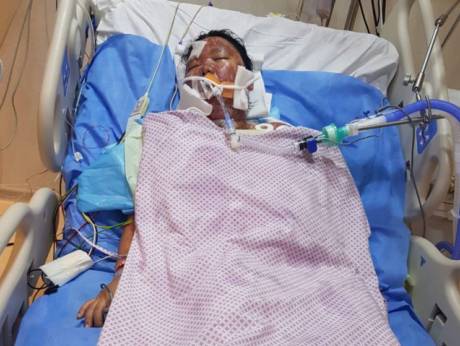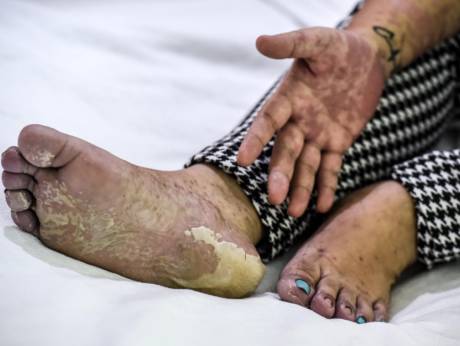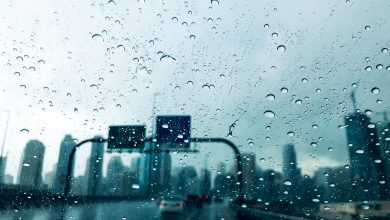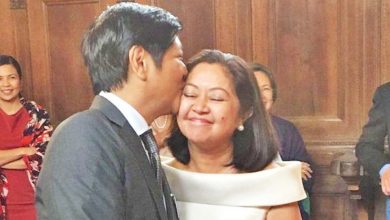An overseas Filipino worker (OFW) has been struggling to overcome a debilitating skin disorder that has left her scarred physically and emotionally.
OFW Jenny Mariano Orpiada was admitted to a hospital in Dubai for checkup. At first glance, large red patches spread in large numbers across her chest. The skin on her arms weren’t spared. There were puffy marks on her arms and her lips were puffy and swollen. There were missing nails on her fingers and toes, too.
“My top lashes will fall out too. And the rest of my nails,” Orpiada said, as reported by GulfNews.
“My legs are peeling now and have blisters, like the ones on my feet, all over them. I can show you if you like,” she added during a interview.
The disease was not just spreading on her skin. It has also taken a toll on other parts of her body.
“I have my vision back in my right eye but my left eye is still blurry, it’s like double vision,” she added.




To hide her disease from prying eyes, the 38-year-old Filipina said she often wraps a scarf around her neck and chest and wears a surgical mask to hide the blisters on her face.
Orpiada’s health struggles began in January after she took medication to control her uric acid levels.
“I first went to a clinic (in Dubai) in December and saw a urologist because my stomach was really sticking out and bloated. They did some tests and said my uric acid level was high,” she explained.
The doctor told her that normal uric acid levels should range from 2.6 – 6 mg/dL. Hers was 9.7mg/dL.
Orpiada took allopurinol to treat her high uric acid. All was well, until she failed to take her medicine when she went to the Philippines for a Christmas vacation. She said she forgot to bring her medication with her.
Upon her return to Dubai, the Filipina began to experience shooting pain in her left arm and found it difficult to move.
Her doctor advised her to take allopurinol plus painkillers called Maxigesic Paracetamols for the pain in her arms.
“I took the medicine for about 10 days (allopurinol and Maxigesic Paracetamols) but then I noticed some lumps on my throat which were very painful,” Orpiada narrated.
She added that she went back to the same clinic and saw an Ear, Nose and Throat (ENT) specialist, who prescribed her additional antibiotics and Cefpodoxime.
After taking the prescribed medications, Orpiada woke up the following day to find her face swollen and her eyes hurt.
“I was in a lot of pain, especially my back. When I lay on my bed I could hear things popping on my back. But I forced myself to sleep,” she said.
She was then rushed to the Medeor 24×7 hospital in the Embassy District area in Dubai.
“She was not in a good condition. Because of the peeling blisters on her back and the bleeding blisters in her mouth, we immediately sent her to the ICU. We basically had to treat her like a burn victim,” said Dr Suresh Babu Rengasamy, Specialist Dermatologist at the Medeor 24×7 hospital.
There, Orpiada was diagnosed with Toxic Epidermal Necrolysis (TEN), a fatal skin disorder that occurs in one in a million people. This disease is caused by the body’s reaction to medicines.
A 2012 study published by Arthritis Care and Research, an official journal of the American College of Rheumatology and the Association of Rheumatology Health Professionals, showed that two to five per cent of patients taking allopurinol may develop side effects.
“Prevention of infection was the real challenge, we had to be extremely cautious. No one could enter Jenny’s room without the proper protection. We had to keep everything in her room aseptic,” said Dr Shahid Hussain, a General Practitioner and an ICU Registra at Medeor 24×7 Hospital.
According to Hussain,a team of eight medical practitioners took turns changing Orpiada’s dressings and cleaning her wounds.
“It was a very challenging procedure. Someone had to hold the breathing tube for two hours, we had to clean her wounds, change her dressings — very carefully — turn her, clean her, and change her sheets during this process,” Dr.Hussain said.
Orpiada spent 10 days in the ICU and another 11 days of treatment. She gradually regained strength and was soon released from the hospital.
Today, the OFW follows a strict list from the doctor, including avoiding direct contact with the sun for three months and conducting physiotherapy exercises to help her regain muscle strength.
Orpiada has suffered enough in a short span of time but despite her ordeal, she remains positive. Her secret? Belief in God and love for her 13-year-old so in the Philippines.
“Through all this I kept praying to God to help me get well so I could see my son again. I couldn’t imagine not seeing him again, he is all I thought about. I am so grateful to be alive,” Orpiada said.
Photo credit: Gulf News





